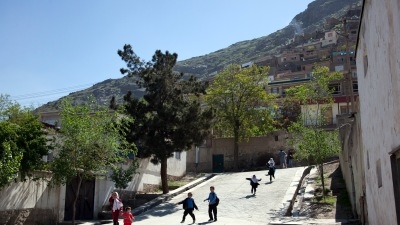It was about six years ago that the Kart-e-Mamorin community first gathered to decide on their most pressing needs. Qadiry became head of the local community council, or “gozar cooperative shura,” of male and female residents that meets to discuss issues in their neighborhood of about 600 households, or about 3,000 people.
“Before this, many of us, individually, were always writing the city and asking for improvements, but nothing happened,” says Qadiry, a retired planning official with Afghanistan’s ministry of civil aviation and tourism. “Together now, we accomplish so much more.”
The neighborhood was badly damaged during a decade of civil strife in the 1990s.
“Many times, my family escaped our house and it would be several months before we could come back,” recalls Qadiry.
“There were rockets and lots of heavy weapons around here,” he notes, pointing to holes punched in a nearby wall. “After, everything was mud and debris, especially in winter and spring. It was a bad environment where people got sick.”
When an official from a KURP partner organization called the CRA, or Cooperation for Reconstruction of Afghanistan, helped the neighborhood council assess what residents wanted most, roads were their top priority.“It was clear that this was going to be an important step for people wanting to move ahead with their lives here,” said CRA official Mohammed Aaref Aasefi.
Residents pitched in
Along with KURP funding, residents donated their own money, time, and labor to get the paving project started in 2007. It took two years to complete about 42 roads and a drainage system covering about 37 acres of terrain.
People were thrilled not only with the quality of the contractor’s work, but also with the absence of any shady dealings, says Qadiry. “Our council made sure to watch, and we didn’t hear any word of corruption. Things were done very transparently here.”
With the roads completed, progress has continued. Another important change came when each home and street was given its own name and number, something that is unusual in Kabul.
“Before it was dangerous if you had a fire or emergency, then you couldn’t give your exact address,” notes Qadiry.
The council also organized weekly collection of household garbage, utilizing wheelbarrows left over from the paving project. And all over the community, people are planting sycamore, poplar, and fruit trees next to large, new homes.
Remaining challenges
While there has been laudable success at the community level under KURP, significant challenges remain at the more macro level. The urban upgrading needs to scale up to cover vast swathes of the city that lie in unplanned development, and local services like drainage, garbage collection and water supply need to be integrated with citywide services.
It still remains for Kabul’s city government to design and implement citywide solid waste management systems that are technically and financially sustainable, while scaling up urban upgrading. Yet residents of Kart-e-Mamorin are optimistic.
“Everything has developed here,” says Mullah Ashabuddin Rahmani, standing outside a new mosque that residents are building. “People got inspired by all the development, after seeing how nice the area is becoming. They want to keep making it better. Perhaps the only problem is that properties are now getting expensive.”
Wandering past with her baby sister, Tabasom, which means "smile" in Dari, 10-year-old Feroza explains that she’s the oldest girl in her family and must help her mother with all household chores.
“Before, we cleaned all the clothes and carpets, sometimes twice a day. But now, we only must do this work maybe two times a week,” says Feroza with a grin matching her sister’s.
At his nearby vegetable stall, 18-year-old vendor Javed agrees road improvements and ensuing prosperity have benefited everyone. Sales have easily doubled, he says, as his little cousin, Daud, tidies an onion pile.
“We are very lucky to be here now. Everything has become very good,” says Javed.

